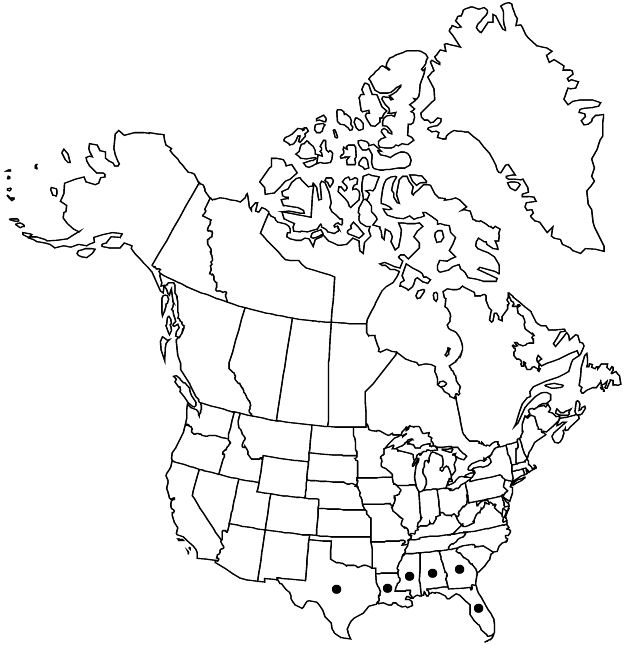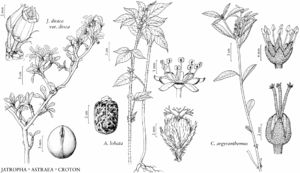Difference between revisions of "Croton argyranthemus"
Fl. Bor.-Amer. 2: 215. 1803. (as argyranthemum)
FNA>Volume Importer |
imported>Volume Importer |
||
| (6 intermediate revisions by 2 users not shown) | |||
| Line 6: | Line 6: | ||
|place=2: 215. 1803 | |place=2: 215. 1803 | ||
|year=1803 | |year=1803 | ||
| + | |other_info_on_pub=(as argyranthemum) | ||
}} | }} | ||
|common_names=Healing or silver croton | |common_names=Healing or silver croton | ||
|special_status={{Treatment/ID/Special_status | |special_status={{Treatment/ID/Special_status | ||
|code=F | |code=F | ||
| − | |label= | + | |label=Illustrated |
}} | }} | ||
|basionyms= | |basionyms= | ||
| Line 28: | Line 29: | ||
|elevation=0–200 m. | |elevation=0–200 m. | ||
|distribution=Ala.;Fla.;Ga.;La.;Miss.;Tex.;Mexico (Nuevo León;Tamaulipas). | |distribution=Ala.;Fla.;Ga.;La.;Miss.;Tex.;Mexico (Nuevo León;Tamaulipas). | ||
| − | |discussion=<p>Croton argyranthemus is closely related to C. coryi. Although they have very different kinds of vegetative indumentum, the staminate petals are characteristically silvery-lepidote in both species.</p> | + | |discussion=<p><i>Croton argyranthemus</i> is closely related to <i>C. coryi</i>. Although they have very different kinds of vegetative indumentum, the staminate petals are characteristically silvery-lepidote in both species.</p> |
|tables= | |tables= | ||
|references= | |references= | ||
| Line 37: | Line 38: | ||
-->{{#Taxon: | -->{{#Taxon: | ||
name=Croton argyranthemus | name=Croton argyranthemus | ||
| − | |||
|authority=Michaux | |authority=Michaux | ||
|rank=species | |rank=species | ||
| Line 51: | Line 51: | ||
|publication title=Fl. Bor.-Amer. | |publication title=Fl. Bor.-Amer. | ||
|publication year=1803 | |publication year=1803 | ||
| − | |special status= | + | |special status=Illustrated |
| − | |source xml=https:// | + | |source xml=https://bitbucket.org/aafc-mbb/fna-data-curation/src/2e0870ddd59836b60bcf96646a41e87ea5a5943a/coarse_grained_fna_xml/V12/V12_1079.xml |
|genus=Croton | |genus=Croton | ||
|species=Croton argyranthemus | |species=Croton argyranthemus | ||
Latest revision as of 19:13, 5 November 2020
Herbs or subshrubs, annual or short-lived perennial, 1–6 dm, monoecious. Stems several from base, branching distally into 2–4 branches, lepidote. Leaves not clustered; stipules subulate, 0.2 mm; petiole 0.2–1(–2) cm, glands absent at apex; blade on proximal parts of stems oval to narrowly obovate, on distal parts oblong to lanceolate-oblong or broadly elliptic, 1–5 × 0.5–2(–3) cm, base rounded to narrowed, margins entire, apex obtuse to rounded, abaxial surface silvery, densely lepidote, adaxial surface darker green, sparsely lepidote or glabrate. Inflorescences bisexual, racemes, 2–5 cm, staminate flowers 15–35, pistillate flowers 2–8. Pedicels: staminate 1–5 mm, pistillate 0–2 mm. Staminate flowers: sepals 5, 5 mm, abaxial surface lepidote; petals 5, oblong-spatulate, 5 mm, abaxial surface densely lepidote, scales translucent, petals appearing hyaline; stamens 10–15. Pistillate flowers: sepals 5–7, connate for 1/2+ length, equal, 3–4 mm, margins entire, apex incurved, abaxial surface lepidote; petals 0; ovary 3-locular; styles 3, 2–4 mm, 1–3 times 2-fid at apex, terminal segments 6–24. Capsules 5–6 × 3–4 mm, smooth; columella 3-angled. Seeds 4–5 × 2.5–3 mm, dull.
Phenology: Flowering Mar–Sep.
Habitat: Deep sandy soils in pinelands, pine-oak scrub, sandhills.
Elevation: 0–200 m.
Distribution

Ala., Fla., Ga., La., Miss., Tex., Mexico (Nuevo León, Tamaulipas).
Discussion
Croton argyranthemus is closely related to C. coryi. Although they have very different kinds of vegetative indumentum, the staminate petals are characteristically silvery-lepidote in both species.
Selected References
None.
